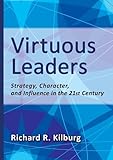Virtuous leaders : strategy, character, and influence in the 21st century / Richard R. Kilburg.
Material type: TextPublication details: Washington, D.C. : American Psychological Association, c2012.Description: xii, 254 p. : ill. ; 26 cmISBN:
TextPublication details: Washington, D.C. : American Psychological Association, c2012.Description: xii, 254 p. : ill. ; 26 cmISBN: - 9781433810961:
- 1433810964 (print ed.)
- 303.34
- .K524 2012
APA ebook
Includes bibliographical references and index.
"It is possible to discern at least three components of effective leadership that endure across time and human history: strategy, character, and influence. Another way to comprehend these essentials involves framing them as the core components of the what and the how of leader performance. Strategy, broadly defined as setting the direction for an organization or organizational unit, can be understood as the answer to the question, What is the most important thing that leaders do? Character, described in this book as the consistent exercise of virtuous behavior in the face of constant turmoil, permanent change, frequent provocation, and demanding conditions, is the second enduring element of effective leadership that I have found. Influence, the ability to create meaningful relationships with others through which the work of an enterprise is accomplished, is the third component that transcends human history and time. Together, character and influence answer the question, how can leaders best accomplish the strategy that they have established for their organizations?"--Preface. (PsycINFO Database Record (c) 2012 APA, all rights reserved).
"Twenty-first century organizational leaders face many difficult challenges. As governments and businesses expand to meet the needs of an ever-increasing population, the decisions leaders make today are more important than ever. With rising competition amid the uncertainty of a progressively globalized economy, success and failure are increasingly defined on an ever-grander scale. In these trying times, how can executives and other business, government, and nonprofit leaders guide their organizations to success amid the challenges of the modern world? In this extensively researched yet thoroughly practical book, renowned executive consultant Richard Kilburg characterizes effective leadership as a combination of specific behaviorally based competencies and virtuous aspects of character. He demonstrates that despite all the complexities of the modern world, the foundations of executive leadership can still be found in the timeless and enduring virtues of the ancient Chinese and Greeks. With rich and informative discussions of the classical and modern literatures on virtue and executive leadership, and a wealth of exercises and questionnaires that translate models of leadership into plans for action, Virtuous Leaders is a vital resource for leaders and executive consultants alike, and is sure to become a classic in the field"--Publicity materials.
Also issued in print.
Electronic reproduction. Washington, D.C. American Psychological Association 2012 Available via World Wide Web Access limited by licensing agreement s2012 dcunns
